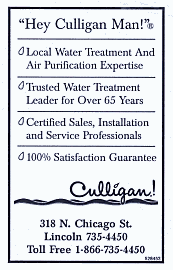|
The proposed River Edge Redevelopment Initiative includes the
designation of redevelopment zones across Illinois that will be
eligible to receive tax credits, exemptions and $20 million in new
grant funding to support cleanup, remediation and redevelopment
efforts that will lead to economic revitalization in these areas.
This initiative combines resources across state agencies and will be
administered primarily by the Illinois Department of Commerce and
Economic Opportunity and the Illinois Environmental Protection
Agency.
"To promote a healthy and vibrant economy, we are targeting areas
of the state that have the greatest need for redevelopment and
potential for growth," Blagojevich said. "River communities were the
original economic engines of Illinois, and there are countless
underutilized and abandoned properties along major waterways prime
for redevelopment. This River Edge Redevelopment Initiative seeks to
provide municipalities and businesses with the additional resources
they need to be able to clean up brownfield sites, spur additional
growth and create more opportunities for our working families."

The redevelopment zones would consist of environmentally
challenged areas that lie adjacent to a river and have economic
development potential, but the cost of redevelopment has made
attracting investment extremely difficult. These zones would be
structured similarly to the current enterprise zone designation.
Municipalities would apply directly to the state to become a River
Edge Redevelopment Zone. Once a zone has been approved, developers
and businesses could be eligible for tax exemptions, including sales
tax on building materials, an investment and jobs tax credit, and
various other deductions. Companies or individuals in the zones
could also be eligible for an environmental remediation tax credit
for certain cleanup costs.
This proposal would also include $20 million in new grant funding
to assist with redevelopment activity in a River Edge Redevelopment
Zone. Municipalities, developers and companies located in these
zones would be eligible to receive funding to support infrastructure
needs for economic revitalization projects, which will ultimately
lead to job creation and economic development in a zone. While many
of these areas were home to former industrial sites, they are now
ideal settings for new residential, office, warehouse-distribution,
retail, recreational, hospitality, commercial and other productive
land uses.
"We are always looking for innovative ways to take advantage of
all of our assets to continue growing the economy and creating more
jobs," said Clayborne, who will sponsor the proposed legislation in
the Senate. "Governor Blagojevich's River Edge Redevelopment
Initiative is exactly the kind of spark needed to turn promise into
prosperity by allowing our river communities to attract more private
investment and economic development opportunities."
"Governor Blagojevich and I are committed to ensuring that our
river communities won't sit on the sidelines as important
redevelopment projects float past them," said LaVia, who will
sponsor the legislation in the House. "This creative program will
provide businesses and towns the tools they need to spur renewed
interest in prime properties that once were and still can be key
components of Illinois' economy. This is a great chance for an
economic revival for cities across the state."
"We have an opportunity here in Aurora, and across Illinois, to
revitalize land that has been languishing for years without
providing any economic benefits to our taxpayers," Aurora Mayor Tom
Weisner said. "Governor Blagojevich and I understand that by making
this kind of important investment, we can open the door to economic
development opportunities that have been closed for far too long. I
look forward to working closely with the governor and the members of
the General Assembly to move the River Edge Redevelopment Initiative
forward."
[to top of second column]
 |
 "Across the state, we constantly hear about the need to redevelop
old, underutilized and contaminated properties," said Jack Lavin,
director of the Department of Commerce and Economic Opportunity.
"But developers and businesses generally won't make significant
investments in areas that require significant amounts of
remediation. With this River Edge Redevelopment Initiative, Governor
Blagojevich is providing vital resources to offset some of these
costs so we can bring more opportunities and jobs to these areas."
Brownfields are abandoned, idled or underused industrial and
commercial properties that have actual or perceived contamination
and an active potential for redevelopment. Brownfields vary in size,
location, age and past use and can include contaminated land varying
from a multi-acre closed factory to a vacant gas station. While
brownfields were once considered to be only an environmental health
issue, they are now fully recognized as areas with the potential to
play a vital role in the economic development of a community. In
Illinois, there are an estimated 7,000-10,000 brownfield sites in
need of remediation.

"As a former mayor of a river community, I know that brownfield
sites, especially those with abandoned properties, present
significant roadblocks to redevelopment," said Doug Scott, director
of the Illinois Environmental Protection Agency. "Municipalities
often don't have enough resources to make a site viable for
potential economic development projects. What Governor Blagojevich
is proposing is a new, integrated set of tools that will lead to a
renaissance along our riverbanks."
Since Blagojevich took office, the cleanup of contaminated sites
has accelerated in Illinois, with thousands of acres at more than
400 sites cleaned up for redevelopment, recreational or natural
habitat use. Through the Municipal Brownfield Redevelopment Program,
the Illinois EPA has provided the initial funding and customized
technical assistance for environmental assessments and cleanups for
119 municipalities, of which 44 are located along rivers. These
grants of up to $240,000 each per community have been the catalyst
for future redevelopment in such river cities as the Quad Cities,
Aurora, East St. Louis, Alton, Dixon, Freeport, Geneva, Ottawa,
Peoria, Rockford, Sterling and Streator. The new initiative
leverages the investments already made in these river communities.
The governor's Opportunity Returns regional economic
development strategy is the most aggressive, comprehensive
approach to creating jobs in Illinois' history. Since a
one-size-fits-all approach to economic development just doesn't
work, the governor has divided the state into 10 regions, each with
a regional team that is empowered and expected to rapidly respond to
opportunities and challenges.
Opportunity Returns is about tangible, specific actions to make
each region more accessible, more marketable, more entrepreneurial
and more attractive to businesses. It is about upgrading the skills
of the local work force, increasing the access to capital, opening
new markets, improving infrastructure, and creating and retaining
jobs. Opportunity Returns is about successfully partnering with
companies and communities, both large and small, to help all of
Illinois reach its economic potential.
[News release] |